In Japanese, ~ni suru ~にする (ni に adverbial copula plus suru する) means various things: it means "to make X be Y" or "to make X become Y;" "to treat X as if it were Y" or "to use X as an Y;" "to choose X" when there are multiple choices, e.g. X, Y or Z; to use a body part, e.g. "(with eyes) to see;" in the pattern ~you ni suru ~ようにする it may mean "to make it so that X does/can do Y;" in the pattern ~koto ni suru ~ことにする it may mean "to decide to do X" or "to pretend X is true;" in the pattern ~ni shite ~にして it may mean "to be X and also Y."
- Tarou ga Hanako wo {yome ni} suru
太郎が花子を嫁にする
Tarou will make Hanako [his] bride. - {karee ni} suru
カレーにする
[I] will choose {curry}. (e.g. when deciding what to eat.) - hito wo {tate ni} suru
人を盾にする
To treat people as {shields}. (to use them as human shields.) - sore wo kuchi ni suru na!
それを口にするな!
Don't use [your] mouth with that!
Don't say that!
Don't eat that! - {{barenai} you ni} shita
バレないようにした
[I] made [it] {so [that] {[it] won't be found}}.
[I] hid [it] somehow. I did something to ensure it won't be found. - {{barasanai} koto ni} shita
バラさないことにした
[I] decided {{[I] won't spread [it]}}.
I decided I won't tell everybody about the secrets that I found out. - {saikyou ni} shite saigo no teki
最強にして最後の敵
The {strongest} and last enemy.
The enemy that is both {the strongest} and the last one.
Grammar
See the article about suru する for details about the grammar. This article is mainly about examples.
In summary: for most of its uses, ~ni suru ~にする is a lexical causative verb phrase forming an ergative pair with the unaccusative counterpart ~ni naru ~になる. Anything ~ni naru is "to become X," anything ~ni suru is "to cause Y to become X." Some uses, however, like with body parts, don't have a ~ni naru counterpart.
The pattern ~ku suru ~くする is used with i-adjectives—~ni suru is used with na-adjectives and no-adjectives (nouns) only (~i ~い becomes ~ku ~く, da だ becomes ni に).
The phrase ~you ni suru ~ようにする is used with stative predicates expressed through verbs (stative verbs, habitual sense of eventive verbs). Verbs don't have an adverbial form, but suru requires an adverb, so ~you ni ~ように is used to satisfy this requirement.
The phrase ~koto ni suru ~ことにする means "to make the situation so," depending on the tense of the relative clause qualifying koto こと, it may mean "to make it happen (in the future)" or "to pretend that's what happened (in the past)."
Usage Examples
- boku wa {kimi wo {boku no oyomesan ni} suru} tsumori demo aru-n-da
僕は君を僕のお嫁さんにするつもりでもあるんだ
I also intend {to make you {my bride}}.- ~tsumori de aru
~つもりである
To intend to... - mo
も
Also. Even.
- ~tsumori de aru
- Context: the story of an ojousama お嬢様 and her butler begins.
- kono otoko wo... {watashi no {atarashii} shitsuji ni} suru.
この男を・・・私の新しい執事にする。
[I] will make this man into {my {new} butler}.
- Context: a main character speaks of his aspirations to his best friend, who shares the same aspirations.
- ore φ, zettai kono yume φ {genjitsu ni} suru yo
俺 絶対この夢現実にするよ
I'll definitely make this dream {reality}. - "ore" janakute "ore-tachi" ne
「俺」じゃなくて「俺達」ね
Not "I," "we."
- Context: an angel is granting any desires to a soul about to be reincarnated.
- jaa {furou-fushi ni} shite-kudasai
じゃあ不老不死にしてください
Then, please make [me] {immortal}.- furou-fushi
不老不死
Non-aging, non-dying. (yojijukugo 四字熟語)
Perpetually young and immortal.
- furou-fushi
- waku
わく
*excited* - hai!
はい!
Okay! - don
ドン
*bam* - {sonna assari dekiru} mono nanoka
そんなあっさりできるものなのか
It's something [that] {can be done so easily}? - subarashii
素晴らしい
Marvelous. - dewa karada no naka wo mana ga guruguru guruguru junkan shite {{oiru} koto no nai} karada ni itashimashou!
では体の中をマナがぐるぐるぐるぐる循環して老いることのない体にいたしましょう!
Then, let's make the mana circulate around and around through inside of [your] body, and turn [it] into a body [that] {never {ages}}.- wo を particle - marks the medium through which movement happens.
- mana
マナ
Common term for magical energy in role-playing games. Also known as MP, magic points, magic power. - oiru
老いる
To age. To grow old. - ~koto ga nai
~ことがない
To never [do something]. (to never age). - ~koto no nai
~ことのない
(same as above, see: no の subject marker.) - ~ni itashimasu
~にいたします
- guruguru
ぐるぐる
*swirling motion* - hoka niwa?
他には?
[Anything else]?
Anime: Kyou kara Ore wa!! 今日から俺は!! (Episode 1)
- Context: Takashi decides to become a delinquent, starting with a change in image.
- {kinpatsu ni} shite paama wo kakete kudasai
金髪にしてパーマをかけてください
Make [my hair] {blonde} and apply a perm. - {hontou ni} ii no? koukousei desho
本当にいいの?高校生でしょ
Is that {really} alright? [You] are a high schooler, aren't you? - ii-n-desu. gaikoku niwa takusan imasu kara
いいんです。外国にはたくさんいますから
It's alright. Because there are a lot [of blonde people] in foreign countries.
- Context: Harima Kenji 播磨拳児 feeds Napoleon, ナポレオン.
- gatsu gatsu
ガツガツ
*eating noise* - ponpon
ポンポン
*tap tap* - {{ii} ko ni} shitero yo, Naporeon
良い子にしてろよ、ナポレオン
Make [yourself] be {a {good} [pig]}, Napoleon.
Be {a {good} [pig]}, Napoleon.- shitero - contraction of shite-iro していろ, meireikei 命令形 of shite-iru.
- Harima Kenji leaves Napoleon behind.
- buhi?
ブヒ?
*concerned pig noise*
- Context: guy comes take his child from a "nursery school," hoikuen 保育園.
- a... arigatou gozaimashita!!
あ・・・ありがとうございました!!
T... thank you [for everything]!!- Past tense of arigatou gozaimasu.
- sensee sayounara
せんせーさようなら
Good bye, teacher. - sayounara
さようなら
Good bye. - otonashii kara chotto dake shinpai datta kedo
おとなしいからちょっとだけ心配だったけど
[She's] quiet so [I] was a bit worried, but - Rin-chan {{tottemo ii} ko ni} shitemashita yo
りんちゃんとってもいい子にしてましたよ!!
Rin-chan made [herself] be {a {very good} [girl]}, [you see]!!
Rin-chan was {a {very good} [girl]}, [you see]!!
- Context: Vignette learns the harsh realities of doing group projects.
- anta-ra {ii-kagen ni} shinasai yo'!!
アンタらいい加減にしなさいよっ!!
You [two], stop it already!!- ii-kagen いい加減 - literally "good measure," used this way to tell people to behave.
- mendou mi-kirenai tte!!
面倒見きれないって!!
I can't take care of all the trouble you make!!- mendou
面倒
Trouble. - mendou wo miru
面倒を見る
To see trouble.
To take care of trouble.
To take care of someone, which is trouble, in the sense of it may cause trouble to you to do it. - ~kiru
~きる
Completely. (auxiliary verb.) - mendou wo mi-kiru
面倒を見きる
To completely take care. - mendou wo mi-kireru
面倒を見きれる
To be able to completely take care.
(potential form.) - mendou wo mi-kirenai
面倒を見きれない
To not be able to completely take care.
(negative potential form.) - Vignette can't handle all this trouble.
- mendou
- {ii-kagen ni} shi-yagare,
いい加減にしやがれ、
[That's enough],
[Stop that],
[Cut it off],- yagare - meireikei 命令形 (imperative form) of yagaru やがる.
- kono yarou!!!
この野郎!!!
[You bastard]!!!
Functional Treatment
- Context: the princess is dead. The demon cleric tells the demon lord how she died.
- chiiin
ちーーーん
*ring of a bell* (sound effect used when a character dies or is defeated, probably originates from the bell used in a butsudan 仏壇, a "Buddhist altar" for a deceased family member.) - doku-kinoko no boushi wo futon ni shita sou desu...
毒キノコの帽子を布団にしたそうです・・・
It seems that [she] made a poisonous-mushroom's cap into a bed.- In other words, she used the cap (the top part) of the mushroom as if it were a bed.
- She treated it as a bed.
- futon
布団
Traditional Japanese bedding, typically placed on a tatami floor. The term refers to both the mattress and the duvet, but just "bed" is a good enough translation most of the time..
- moshikashite baka na no ka?
もしかしてバカなのか?
Could it be that [she] is an idiot?
- Context: Kaguya is asked a quiz question that's too easy for a genius like her, and congratulated after getting it right.
- baka ni shinaide kudasai...
馬鹿にしないでください・・・・・・
[Don't take me for an idiot.] - konna kodomo-muke no mondai
tokete touzen desu...
こんな子供向けの問題
解けて当然です・・・
A question [made] for kids like this,
solving [it] is [only] natural...
Choice
- Context: Yukimoto Yuzu 雪本柚子 imagines herself as a bride who would support her future husband.
- okaerinasai anata ♡
おかえりなさいあなた♡
[Welcome home, dear.]- anata
あなた
You. (second person pronoun.)
Sometimes used by a wife to refer to her husband.
- anata
- ofuro ni suru?
gohan ni suru?
soretomo... wa... ta... shi...?
お風呂にする?
ご飯にする?
それとも・・・わ♡た♡し♡??
[What do you want to do]?
[Eat]? [Take a] bath? Or... me?- This is a trope called shinkon santaku 新婚三択, "newly-wed three-choices."
- Context: Gojou Satoru 五条悟, who doesn't like to obey rules, is told to obey societal norms.
- ichininshou "ore" wa {yameta} hou ga ii
一人称「俺」はやめた方がいい
[It] would be better if {[you] stopped} [using] the first person pronoun "ore."- ore - a masculine first person pronoun that's not used in formal situations.
- 「」 - quotation marks.
- a´?
あ゙?
Ah?
- What did you just say to me???
- toku ni {me-ue no} hito no mae dewa ne
特に目上の人の前ではね
Specially in front of [your] superiors, [alright].- {me-ue no} hito
目上の人
People [who] {are above you}.
[Your] superiors.
- {me-ue no} hito
- {Tengen-sama ni au kamoshirenai} wake dashi
天元様に会うかもしれないわけだし
{[We] might meet Tengen-sama}, [after all].- In this series, Tengen-sama is an important person, as hinted by the fact the ~sama suffix is used with their name.
- "watashi", saitei demo {"boku"} ni shi na
「私」最低でも「僕」にしな
[Use] "watashi," or at very minimum use {"boku"}, [okay].- Here, "to choose" a pronoun translates to "to use" it.
~ようにする
- Context: "platelets," kesshouban 血小板, drawn as cute anime girls, receive their marching orders.
- {hagurenai} you ni {katte na} koudou wa shinai koto!
はぐれないように勝手な行動はしないこと!
Do not [act on your own] as {to not stray away}!- katte
勝手
(refers to doing things without consulting others.) - hagureru
逸れる
To stray away [from a group]. To lose sight of [one's group].
- katte
- hai'!
はいっ!
Yes, [ma'am]! - hoka no ko to kenka shinai koto!
他の子とケンカしないこと!
Do not fight with other kids! - hai'!
はいっ!!
Yes, [ma'am]! - jiipiiwanbii toka wo chanto tsukatte {{tobasarenai} you ni} suru koto!
GPIbとかをちゃんと使って飛ばされないようにすること!
Do use GPIb, etc. properly, making [it] {so that {[you] don't get sent flying away}}!- GPIb, Glycoprotein Ib, allow platelets to adhere at sites of injury.
- tobu
飛ぶ
To jump. To fly. - tobasu
飛ばす
To make [something] fly. - tabasareru
飛ばされる
To be made fly [by something]. (e.g. to be sent flying away by the wind.)
- Context: a boy wants to buy a book, but it's out of stock.
- nandeshitara hairi shidai otaku e otodoke itashimashou ka
何でしたら入り次第お宅へお届けいたしましょうか
[If you want] [I] will deliver [it] to [your] house [as soon as] [it] enters [stock].- shidai
次第
Depending on. In this case, when he delivers the book depends on when it enters stock. As soon as.
- shidai
- sou shite kureru?
そうしてくれる?
[You] will do so for [me]? - daikin wa {{sono ba de harau} you ni} shitoku kara
代金はその場で払うようにしとくから
As for the payment, [I] will make [it] {so [that] {[it] is paid there}}.
- i.e. the payment will be ready at his home for when it arrives.
- shitoku - contraction of shite-oku しておく.
"And" にして
- Context: an explanation of what the king is.
- maou, {{makai no shihaisha ni} shite} {subete wo gyuujiru} akuma no ou
魔王 悪魔の支配者にしてすべてを牛耳る悪魔の王
Demon-king: [he] {is {the lord of the demon world}, and} the king of demons [that] {rules over everything}.- Here, we're saying the maou is the makai no shihaisha on top of also being subete wo gyuujiru akuma no ou.
- Context: text of lore tablet as seen in Hollow Knight's Japanese translation.
- For reference, you can watch a VTuber (Shirakami Fubuki 白上フブキ) reading this part out loud: 【#1】 Hollow Knight 【ホロライブ/白上フブキ】 - via youtube.com
- Beware you'll be spoiled if you watch the video series before playing Hollow Knight (she played it until the ending).
- {kouki na} mono yo, kore wa {sonata dake ni tsutaeru} kotoba.
高貴な者よ、これはそなただけに伝える言葉。
{Noble} one, these are words {to convey to you alone}.
Higher beings, these words are for you alone. (original English) - kore yori saki, sonata wa ou to souzoushu no chi ni hairu.
これより先、そなたは王と創造主の地に入る。
Beyond this point, you'll enter the land of the king and creator.
Beyond this point you enter the land of King and Creator. (original English) - sono shikii wo koe, ware-ra no hou ni shitagau ga ii
その敷居を越え、我らの法に従うがいい。
Cross its threshold and obey our laws.
Step across this threshold and obey our laws. (original English.) - soshite mokugekisha to naru no da.
そして目撃者となるのだ。
And become witness. - {{saigo ni} shite} tada hitotsu no bunmei, {eien naru} oukoku, "Harounesuto" no.
最後にして唯ひとつの文明、永遠なる王国、”ハロウネスト”の。
The culture [that] {is {the last} and} the only one, the kingdom [that] {is eternal}. Of Hallownest.
The {{last} and} only culture, the eternal kingdom. Of Hallownest.
Bear witness to the last and only civilisation, the eternal Kingdom. Hallownest. (original English.)
- The Japanese version ends with a no-adjective that qualifies mokugekisha of a previous sentence.
- Harounesuto no mokugekisha to naru no da.
ハロウネストの目撃者となるのだ
Become witness of Hallownest.
Become Hallownest's witness.
~ことにする
- Context: a furry declares his love for a married kemono character who apparently wears only an apron. Unsure of what to do, she runs away.
- watashi wa {nanimo kikanakatta} koto ni suru wa!
私はなにも聞かなかった事にするわ!
I'll pretend {[I] didn't hear anything}!
(>//w//< *blushes through fur*)
I'll pretend you didn't tell me this!- I won't even tell my husband about it!
- Let's forget this happened, okay?!
- ma, mata ne, Genzou-san!
ま またね源蔵さん!
[Goodbye], Genzou-san!- mata - "again," as in "see you again," can be used to say bye.
Body Part
- Context: Shinomiya Kaguya 四宮かぐや tells Adolphe Pescarolo アドルフ・ペスカロロ why she can't take photos.
- {{futokutei-tasuu ga me ni suru} medhia ni kao-jashin wo keisai shite wa naranai} kimari deshite
不特定多数が目にするメディアに顔写真を掲載してはならない決まりでして
[My family made] a decision [that] {[I] shouldn't publish face-photos on media [which] {a large number of unspecified people see}}.- ~jashin
~じゃしん - shashin
写真
Photo.
- ~jashin
- ou~~ {kaodashi enu-jii toiu} yatsu desu ka
オゥ~顔出しNGトイウやつデスか
Ooh~~ is [this that thing] {called kaodashi NG}?- Adolphe Pescarolo is a foreigner. His Japanese is accented. This is represented orthographically by spelling words with katakana.
- kaodashi NG - phrase typically used by people who want to remain anonymous on the internet despite appearing in photos, videos. It means:
- kao wo dasu no wa dame
顔を出すのはだめ
Exposing [one's] face is Not Good. (is not okay, not permitted.)
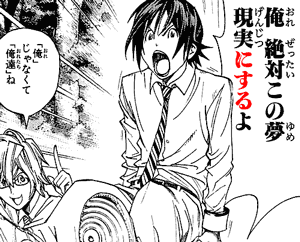
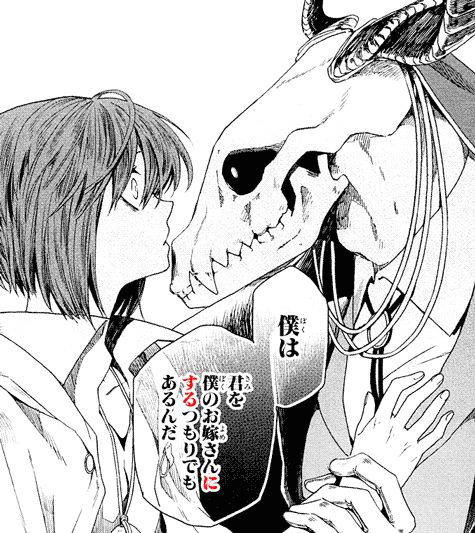
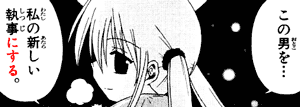
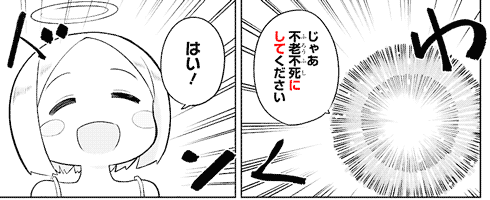
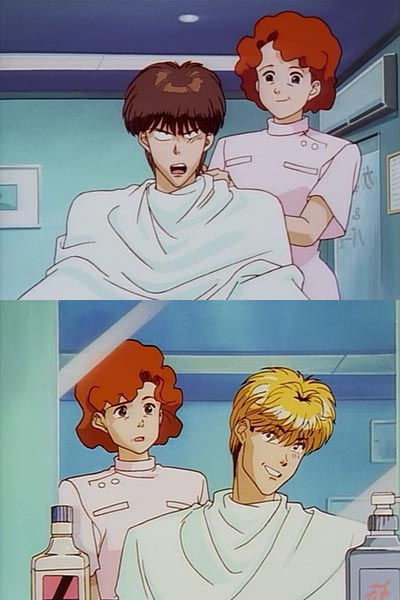
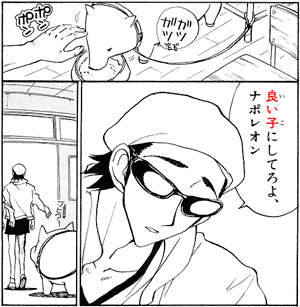

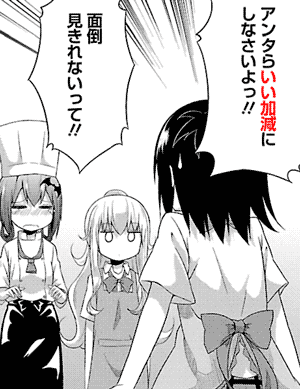
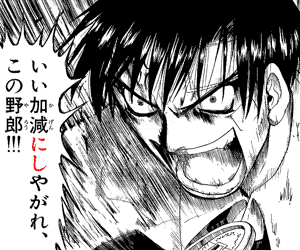
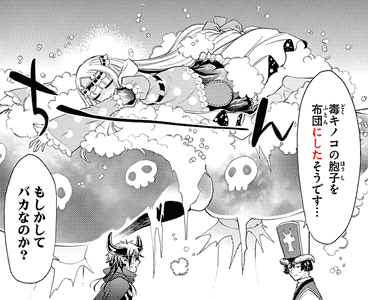
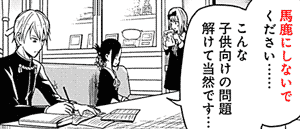
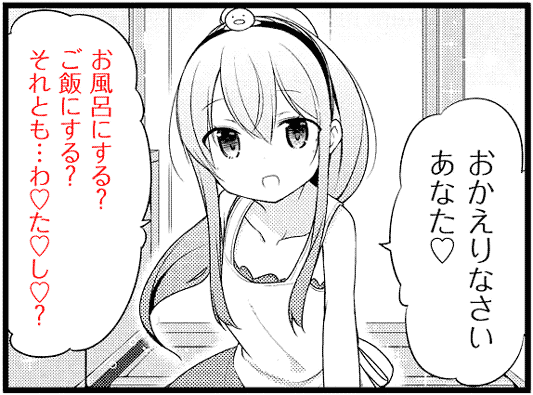
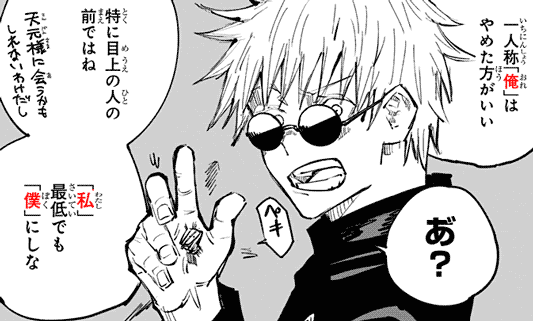
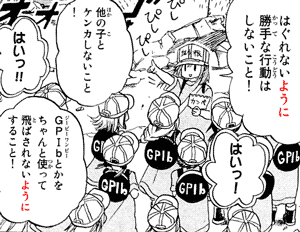
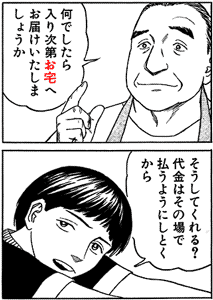
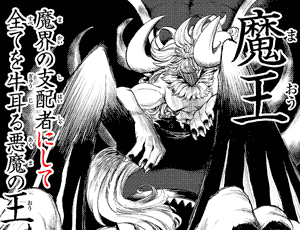
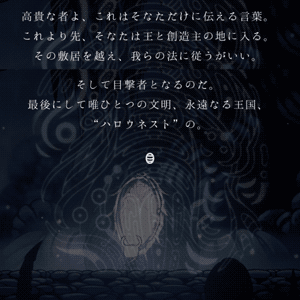
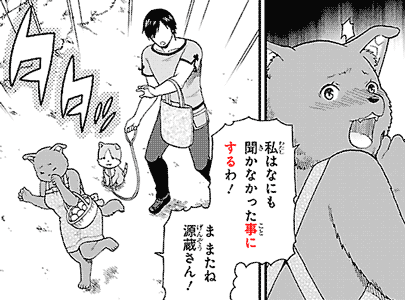
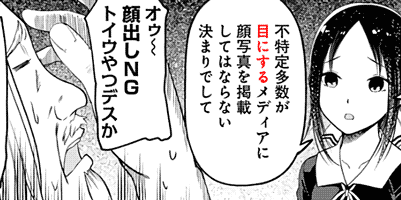
No comments: